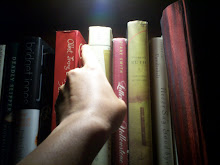After a good two months of slow, painstaking reading, I have finally finished reading Ken Follett's novel, The Pillars of the Earth. The time it took me to finish the book reflects in no way upon the book itself, but upon the fact that I hadn't had much time to read until recently.
Pillars of the Earth is almost 1000-pages long and spans over fifty years of medieval history. If you've seen Paul Haggis' 2004 film, Crash, then you'll be familiar with the broad idea of the novel. Pillars takes characters from many different walks of life and unites their lives, ambitions, and story lines in one town, with the building of a cathedral church. Their affairs tangle together quickly and become inexorably linked, which is what drives the novel's plot. The book is also like Robert Bloch's Psycho in that it is divided into two parts, each of which is presided over by a different protagonist.
The novel partially takes place during a period in history known as The Anarchy--a nineteen year-long war of succession between King Stephen (also known as Stephen the Usurper) and the Empress Maud following the death of the King Henry's heir, William, aboard the White Ship, which sank off the coast of France in the year 1120. This incident plays a major role in the political undercurrents which guide the novel's plot (and, besides, is a really interesting era of British history on its own).
And now for an attempt at a spoiler-free plot summary... I suppose I could come up with some keywords and list them in vague order of appearance. Here goes:
public execution, perjury, maternal morbidity, attempted infanticide, treason, invasion, ecclesiastical trickery, ruination, bribery, LOTS OF WAR, arson, architecture, political cunning, building, evil plots, self-denial, oopsies-babies, epic love stories, more evil plots, global travel, epic disaster, more war, murder, royal succession, court disputes, marriage, divorce, skirmishes, religious miracles, science, public execution, changing the church forever
Ok, the order sort of went to crap towards the middle of the list, but it was spot-on at the beginning and end. Anyway, there is a LOT that happens, to say the least.
There are many things that I love about this book. The characters are strong, and although some of them ended up being written too black-and-white for my taste, they are written vividly and well. The settings are also stunningly portrayed. Follett has a real knack for writing engagingly about architecture, of all things, and paints beautiful pictures with his words.
The plot is also strong in that it honestly does have something for everyone. Follett keeps the action varied, and in doing so engages his audience even further. As in 'Crash', the end of the novel sees all the threads coming back together to form a complete, intricate tapestry of intersecting lives and worlds. The melding of political intrigue, war, religious zeal, and iron-willed industry and innovation is evocative and intriguing.
When I further analyze my fascination with this book, I have to admit that I've always had a weird, distant sort of fascination with the concept of a God. I don't consider myself a believer in much other than science and people, but I definitely found myself interested by the frequently-mentioned theme of "God's will". Watch out. Some day, when I write a post about East of Eden, this idea--the idea of human will versus what is construed as the will of God--will come up again.
In summary, I looooved The Pillars of the Earth, and I'll read it again as soon as I get a chance.
Grade: A
Rating: 15+, for language and strong adult content (definitely took me by surprise)
Since finishing the book I've also had the chance to watch the recent STARZ channel series. I was fully aware before I started watching that it wasn't going to be great, since trying to cram such a huge book into a few one-hour episodes was definitely not going to happen. However, I wasn't expecting to be quite so disappointed. They drastically changed the fates of certain characters, cut out major themes, and added some really awkward undertones to certain character dynamics (hello, incest?). The one thing that I felt the series was good for was the portrayal of England at the time. While Follet's writing provided me with a lot of fabulous mental images, it was nice to have some of the corroborated by actual visuals. If you haven't read the book and have watched the series, I implore you not to judge a novel by its screen adaptation. The book is a zillion times better.



